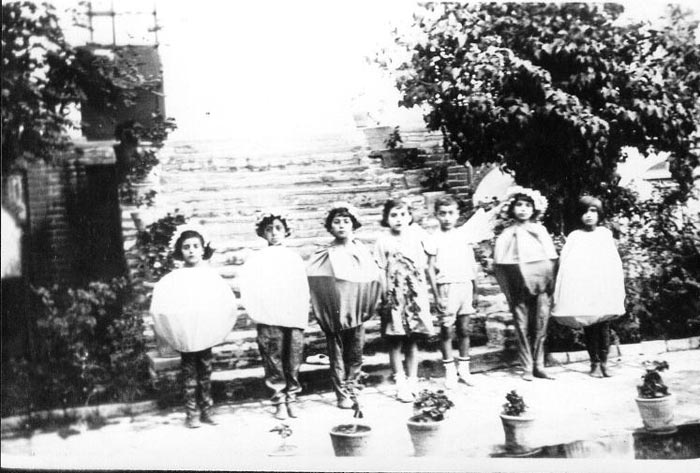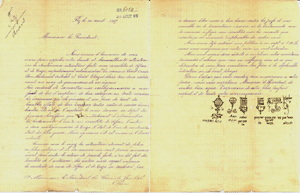Archives
Practical Information
Access to Archives
For a consultation concerning archives and special collections, please make an appointment during the following hours:
Tuesdays, Wednesdays, and Thursdays from 9 AM to 12 PM.
The AIU’s historical archives from 1860-1940 are processed and open to the public.
Access to historical Archives is submitted to the Library Director’s authorization.
Students should present their subject of research as well as a letter of recommendation from their academic advisor.
Personal research is possible for teachers and families of teachers at the AIU;
Microfilmed collections can also be accessed during the afternoon through use of available reading machines.
Access to other collections preserved by the AIU
Certain collections are either special gifts or are held in safekeeping. In order to access these collections, one must have special authorization.
In order to access central consistory Archives, contact:
Philippe Landau
Conservateur des Archives
ACIP- 17 rue Saint Georges 75009 Paris
Description of Collections
Since it was founded in 1860, the AIU has kept records of correspondences between the Central Committee in Paris and the AIU schools in the Mediterranean; the Middle East, and the Balkans. These archives were stolen by the Germans during World War II, only to be found by the Liberation Party years later. Classées en 1960, elles constituent le fonds Archives historiques(1860-1940), dont l’inventaire est aujourd’hui disponible sur notre base de données. Nous procédons actuellement au reclassement, au reconditionnement et au microfilmage de ce fonds, qui reste accessible au public. Le fonds Procès-Verbaux du Comité Central (1860-1976) retrace l’histoire de l’institution. The historical archives (1860-1940) were classified in 1960. The inventory of these archives in available on our database. We are currently in possession of microfilms (which are in the process of being reordered) as well, which are available to the public. The collection “Procès-Verbaux” of the Central Committee (1860-1976) retraces the history of this institution. Another section of the archives has its own unique history. Confiscated in 1945 by Soviets, they were conserved by the Russian Secret Services until 2000 when they were reinstated in the AIU’s collections. This occurred after a series of negotiations between Paris and Moscow. They make up the Moscow Collections. The Delegation of the AIU in Morocco collections are made up of the correspondence between Casablanca and the central committee Numerous Institutions have wished to entrust their archives to the AIU: Consistoire Central, CRIF, OSE, CECJF. These organisations also offer consultations for students and other researchers who frequent the library. Likewise, certain leading figures in the world of Jewish Studies and their families have wished to donate their personal archives. Some of these leading figures include: Paul Bauer, Jean Ellissen, Elian Finbert, Henri Hertz, Kruger, Bernard Lazare, Jacques Lazarus, Sarah Leibovici, Edmond Maurice Lévy, Bernard Mélamède, Pierre Mendès France, Salomon Grumbach, Rachel Minc, Louis Oungre, Isidore Simon After the World War II, the AIU’s archives were in a state of extreme disorder. -A small part of the archives were stored at rue La Bruyère and maintained their original classification -The majority of the archives, however, were transferred to Germany. The archives, as well as the AIU books, were able to be recuperated thanks to Maurice Liber, a member of the Central Committee A small part of the collection was labeled “lost”. However; 50 years later we were able to find this part of the collection in Moscow! (view The Moscow Archives) From 1958 to 1960, George Weill (assisted by André Kaspi) directed the classification of the archives, with the 100th anniversary of the Alliance in mind. He devised a new classification scheme for the AIU archives and redesigned the inventory according to the thematic system from each department. George Weill violated this principle only once. He created an entire artificial series, “la série C;” for which he extracted exceptional documents from their original files. This work gives the Alliance a collective memory without taking its after-war history for granted. Although the Alliance was betrayed by Vichy France, its schools in Morocco, Tunisia; and the Middle East were still granted aid. For several years, the archive services at AIU have made efforts to modernize its inventory. The classification system has been perfected, boxes of material have been arranged, and new materials have progressively been integrated into the database, allowing research opportunities to skyrocket. These archives illuminate not only the history of the Alliance and its schools across the world, but also traditional Jewish life in Eastern ghettos, Jewish neighborhoods in North Africa, anti-semitism and relations with non-jews, competition with colonial powers, and Jewish morals in relevant countries. The archives that are labeled as modern date from 1945 to 1976, the year of the death of president René Cassin. These archives retrrace the history of AIU schools during the period of decolonisation, which is marked by AIU political action around the world. Several files also retrace the relations between the AIU and other Jewish organizations, in France and around the world. These archival collections consititute an irreplacable source of information about Jewiszh life following WWII. The classification of these archives started in 2005, and is still in the process of being finished. For all questions, contact Ariel Danan. The archives of former AIU President René Cassin are now available for consultation. The collection of archives of the Delegation of the AIU in Morocco (1933 to 1956) containt mainly the correspondence betzeen the delegation in Casablanca and the Central Comitee. During the war, the documents conserved at the office at 45 Rue La Bruyère went taken by the German troups and sent to berlin. The red army later found them there. Un fonds a été créé à Moscou pour tous les documents récupérés sur le territoire allemand :les Archives centrales spéciales de l’Etat de l’URSS.Ces archives, considérées comme "disparues" ont été redécouvertes en 1992. Un accord fut signé en novembre 1992 entre les gouvernements français et russes : les russes s’engageaient à rapatrier les archives volées, et les autorités françaises à fournir des moyens matériels aux archives russes pour permettre le microfilmage des documents et participer à la modernisation des services russes. Après huit années de négociations rendues difficiles par les soubresauts de la vie politique russe, grâce au travail sans relâche de la direction des archives de France et de la direction des archives du ministère des affaires étrangères, les archives furent rendues à l’Alliance israélite universelle en mai 2001. Les archives revenues de Moscou contiennent : une collection concernant l’Ecole Normale Israélite Orientale AP 1 : Edmond Maurice Lévy Voici la liste de fonds particularité Commission des écoles
une collection concernant l’Alliance israélite universelleVoici la liste des archives privées
AP 2 : Sarah Leibovici
AP 3 : Paul Bauer
AP 4 : Jean Ellissen
AP 5 : Henri Hertz
AP 26 : Isaac Pougatch
Fonds d'AlgerConsistoire Central
Etude Moch
Fonds OSE
Fonds CRIF
Fonds CECJF
Fonds Coupures de presse

